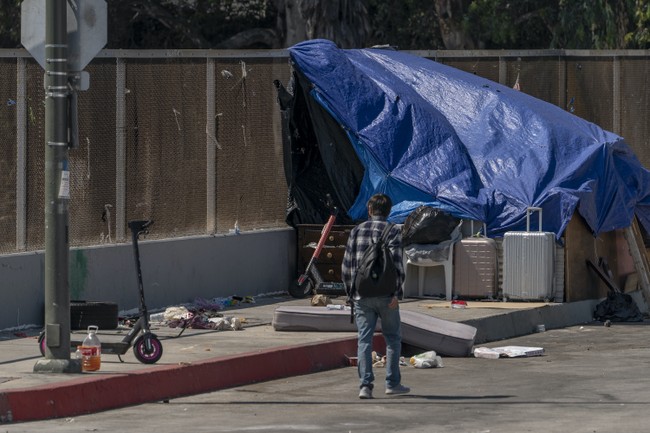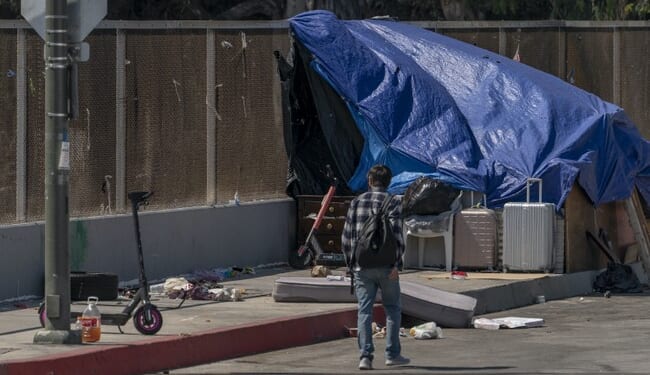
The case out of Oregon that the Supreme Court is taking up today is a sticky one that will likely impact ongoing debates in nearly every large city in the United States. In the ongoing crises of homelessness and illegal migrants flooding the nation, some jurisdictions have taken to toughening up their laws, allowing police to clear homeless encampments and addicts sleeping on public sidewalks or in parks. This has resulted in lawsuits from activists who claim that the homeless are being targeted and being treated unfairly. The question the court will seek to address is whether or not it is constitutionally legal to arrest someone for sleeping outdoors on public property, particularly if there is no room available in homeless shelters. Some lower courts have already ruled that such actions are not constitutional. (Associated Press)
The Supreme Court will consider Monday whether banning homeless people from sleeping outside when shelter space is lacking amounts to cruel and unusual punishment.
The case is considered the most significant to come before the high court in decades on homelessness, which is reaching record levels in the United States.
In California and other Western states, courts have ruled that it’s unconstitutional to fine and arrest people sleeping in homeless encampments if shelter space is lacking.
A cross-section of Democratic and Republican officials contend that makes it difficult for them to manage encampments, which can have dangerous and unsanitary living conditions.
The specific case being considered began in Grants Pass, Oregon, a small rural town where a $295 fine was imposed for sleeping outside. As in many other locations, the homeless had begun camping in the town’s public parks. Authorities argued that the encampments led to unsanitary conditions and lawlessness. But advocates argued that there was nowhere else for the homeless to go.
The 9th Circuit Court of Appeals already struck down the ban, which is currently on hold. But Oregon appealed the ruling and now it’s been dumped in the lap of the Supreme Court. Opponents claim that the ban violates the Eighth Amendment’s protections against excessive fines and punishment.
I agree that we are desperately in need of a solution to the swelling problem of homelessness and the growing armies of illegal migrants overrunning so many parts of the country. But I’m not sure if a ban on sleeping outdoors is the answer, whether it’s constitutional or not. These problems are largely of the government’s own making, of course. When we began decriminalizing everything, “reimagining” the police, and driving up inflation and the cost of almost everything – particularly housing – such conditions were clearly inevitable.
But at the same time, you would have to be a fairly heartless person to look at the individuals who find themselves in such conditions and conclude that locking them up or charging them fines that they obviously have no money to pay was the best solution. The most immediate way to tame this issue would be a return to a robust economy with plenty of well-paying jobs available. Sadly, that doesn’t look like it’s going to happen any time soon given the nation’s current leadership.
Then there is the underlying question of how any municipality can craft a constitutional law involving sleeping outdoors. If you pass a law, it is supposed to apply to everyone equally at all times. The intent of the Oregon law is obvious, but would the police also be issuing fines to average citizens who go for a walk in the park and nod off on a park bench? If not, then the law would not be applied equally. Yes, the optics are glaringly different when you compare someone dozing on a park bench to a drug addict who is passed out on the sidewalk, but that’s not the point. It’s a law banning “sleeping.” Presumably, if one of the homeless with access to a lot of coffee manages to remain awake all night, they wouldn’t be impacted by the law.
I’m not getting any sense of how this more conservative bench at SCOTUS will rule on this one, though I would guess that will support the decision of the 9th Circuit. No matter what they decide, however, the eventual ruling is not going to solve the problems of illegal migrants and soaring homelessness. In fact, it may just make matters worse.

